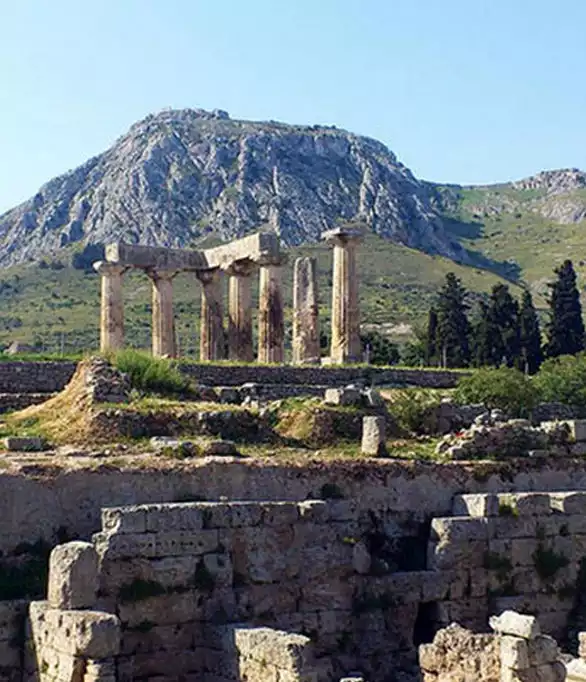
Corinth, an ancient city-state on the isthmus connecting Peloponnese to mainland Greece, boasts a rich tapestry of cultural and historical significance, particularly in the context of early Christianity. This city, flourishing in antiquity, served as a pivotal hub for commercial, social, and religious interactions, laying a vital foundation for the spread of Christianity in the Greco-Roman world.
The etymology of Corinth derives from its ancient Greek name, Korinthos. Historically, Corinth’s strategic location fostered its development into a prosperous trade center, bustling with diverse cultural exchanges. These dynamics facilitated the introduction and propagation of various religious beliefs, including Christianity. The Apostle Paul’s extended stay and the establishment of a Christian community here, as detailed in the New Testament’s Acts and the Pauline Epistles, particularly the First and Second Corinthians, underscore Corinth’s integral role in early Christian history.
The Pauline Connection and Corinthian Church
Corinth’s connection to Christianity is inextricably linked with the Apostle Paul’s missionary journey. Around 50 AD, Paul arrived in Corinth, a cosmopolitan city known for its intellectual and spiritual pluralism. Here, he encountered a mosaic of cultures and religions, from Greek polytheism to Roman Imperial cults. Amidst this diversity, Paul established the Corinthian church, a significant accomplishment in the spread of early Christianity.
Paul’s epistles to the Corinthians, predominantly First Corinthians, provide a vivid portrayal of the early church’s challenges and growth. These letters, rich in doctrinal content and ethical teachings, reflect the complexities of nurturing a nascent Christian community within a predominantly pagan environment. Paul’s guidance on issues such as spiritual gifts, the resurrection, and Christian conduct, written to address specific situations in Corinth, have universal applicability and remain influential in Christian theology and practice.
Additionally, the epistles reveal the social and moral dilemmas faced by the Corinthian believers. Paul’s counsel on matters such as division within the church, immorality, and the Lord’s Supper highlights the practical aspects of living a Christian life in a diverse and often conflicting cultural setting. His emphasis on unity, love, and the primacy of Christ’s teachings helped solidify the foundation of the Corinthian church, contributing significantly to its resilience and growth.
Through his teachings and personal example, Paul left an indelible mark on Corinth, shaping its religious landscape. The city’s transformation from a melting pot of various beliefs to a stronghold of Christian faith illustrates the profound impact of Paul’s ministry and the resilience of early Christian communities in adapting to and thriving within complex social contexts.
Socio-Religious Dynamics in Corinth
The socio-religious landscape of Corinth during the early Christian era was a tapestry of myriad beliefs and practices. This diversity, fueled by the city’s status as a trade hub, brought together a confluence of Greek, Roman, and Eastern religions. Pagan temples, Jewish synagogues, and Christian house churches coexisted, providing a unique backdrop for the spread of Christianity.
This eclectic environment posed both challenges and opportunities for the early Christians. On one hand, the prevalent pagan rituals and the notorious Isthmian Games, with their associated practices, often clashed with Christian principles. On the other hand, the city’s diversity allowed for greater dialogue and the dissemination of Christian teachings. The social stratification of Corinth, which included wealthy merchants, skilled artisans, and slaves, also influenced the structure and dynamics of the Christian community. Paul’s teachings often addressed these socio-economic disparities, emphasizing equality and unity in Christ.
Corinth’s significance in early Christianity extends beyond its geographical and historical context. It stands as a testament to the resilience and adaptability of early Christian communities. The challenges faced and overcome by the Corinthian church offer enduring lessons in faith, unity, and ethical living. Today, Corinth continues to be a focal point for scholars and believers alike, providing insights into the complexities of early Christian life and the transformative power of faith in diverse societies.
References
- Harris, Stephen L. “Understanding the Bible.” McGraw-Hill Education, 2018.
- Horrell, David G. “Social-Scientific Approaches to New Testament Interpretation.” T&T Clark, 2006.
- Murphy-O’Connor, Jerome. “Paul: A Critical Life.” Oxford University Press, 1998.
- Winter, Bruce W. “After Paul Left Corinth: The Influence of Secular Ethics and Social Change.” Eerdmans Publishing Co., 2001.
